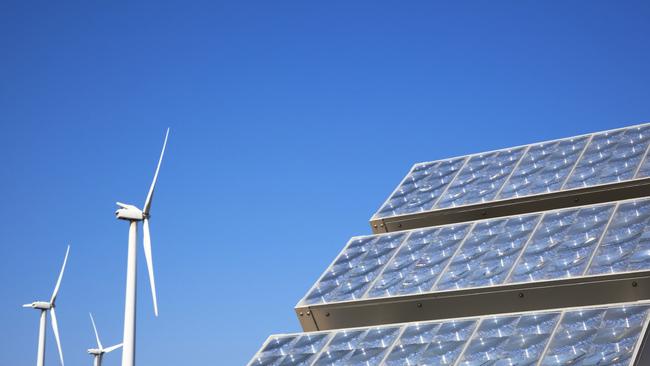BP buys 40.5pc stake in Pilbara hydrogen project, which it will operate with Macquarie, Intercontinental Energy and CWP Global
The oil and gas major will take a 40.5 per cent stake in the Pilbara’s big green renewable project and become its operator with existing partners including Macquarie, Intercontinental Energy and CWP Global.

Oil and gas giant BP has made one of its biggest bets on producing green hydrogen after buying into Western Australia’s $US36bn ($52bn) Asian Renewable Energy Hub in the Pilbara with plans to become a major exporter of the alternative green fuel.
As revealed by The Australian on May 9, BP will take a 40.5 per cent stake in the project and become its operator with existing partners including Macquarie, Intercontinental Energy and CWP Global. The energy player, which owns stakes in both the North West Shelf and Browse gas projects in WA, wants to control 10 per cent of global hydrogen markets as part of its long-term goals.
The 26 gigawatt project – which equates to a third of all electricity generated in Australia – is one of the biggest hydrogen and renewable energy projects under planning in the world and the 6500 square kilometre site will cover an area 10 times the size of Singapore. It plans to eventually produce 1.6m tonnes of green hydrogen annually or 9m tonnes of green ammonia, putting it on course to become one of the largest global developments of its kind.
The project was designed to include 1753 wind turbines and up to 10,800 megawatts of solar capacity, spread over a total area of more than 660,000ha northeast of Port Hedland.
Renewable energy produced by the solar and wind farms would power 14GW of electrolysers to convert desalinated seawater into green hydrogen, which would then be converted to ammonia for export to Australia’s major trading partners.
The proponents originally planned to run an undersea electrical cable from the project to Singapore, but have since pivoted to using the energy to create hydrogen and produce ammonia for export around the world.
AREH was the centre of controversy in mid-2021 when Environment Minister Sussan Ley knocked back the project’s revised plans – despite having previously granted the renewable energy hub environmental approval and major project status – on the grounds it would have a “clearly unacceptable” impact on birdlife in the area.
The nearby 80 Mile Beach is a Ramsar-listed wetland and a major habitat for migratory bird species.
BP’s executive vice president of gas and low carbon energy, Anja-Isabel Dotzenrath, told The Australian it was confident of securing environmental approvals.
“This is is a very, very big project and was with all of these large infrastructure projects, I think they are naturally environmental concerns, which we take very, very seriously. We’re working with the local governments, with the community, with the traditional landowners. And there are ways to do this by being very mindful of certain areas and protected species. We are making good progress on alternative solutions,” Ms Dotzenrath said.
BP said the project is expected to abate around 17 million tonnes of carbon in domestic and export markets annually, equating to roughly 0.5 gigatonnes of carbon savings over the lifetime of the project2.
InterContinental Energy will hold a 26.4 per cent stake with CWP Global at 17.8 per cent and Macquarie Capital and Macquarie’s Green Investment Group at 15.3 per cent.
CWP Global said having BP’s clout in the joint venture would help accelerate the project.
“At full capacity, AREH will require upwards of $US30bn in project finance. The addition of bp as major shareholder and operator, with a proven track record for projects at this scale, will be welcomed wholeheartedly by future investment partners and customers for our green energy,” CWP Global co-founder Alex Hewitt said.
“CWP is driven by the urgency to rapidly decarbonise the global economy. The race to green energy is on. Recent months have demonstrated the uncertainty and disruption that comes with over-reliance on fossil fuels. Green hydrogen is a critical pathway for enhancing energy security and decarbonising hard-to-abate sectors, like mining, steel-making and long-range shipping. And finding a like-minded oil and gas major to join us on the journey opens an important window into the decarbonised energy future that is fast becoming our new reality.”







To join the conversation, please log in. Don't have an account? Register
Join the conversation, you are commenting as Logout